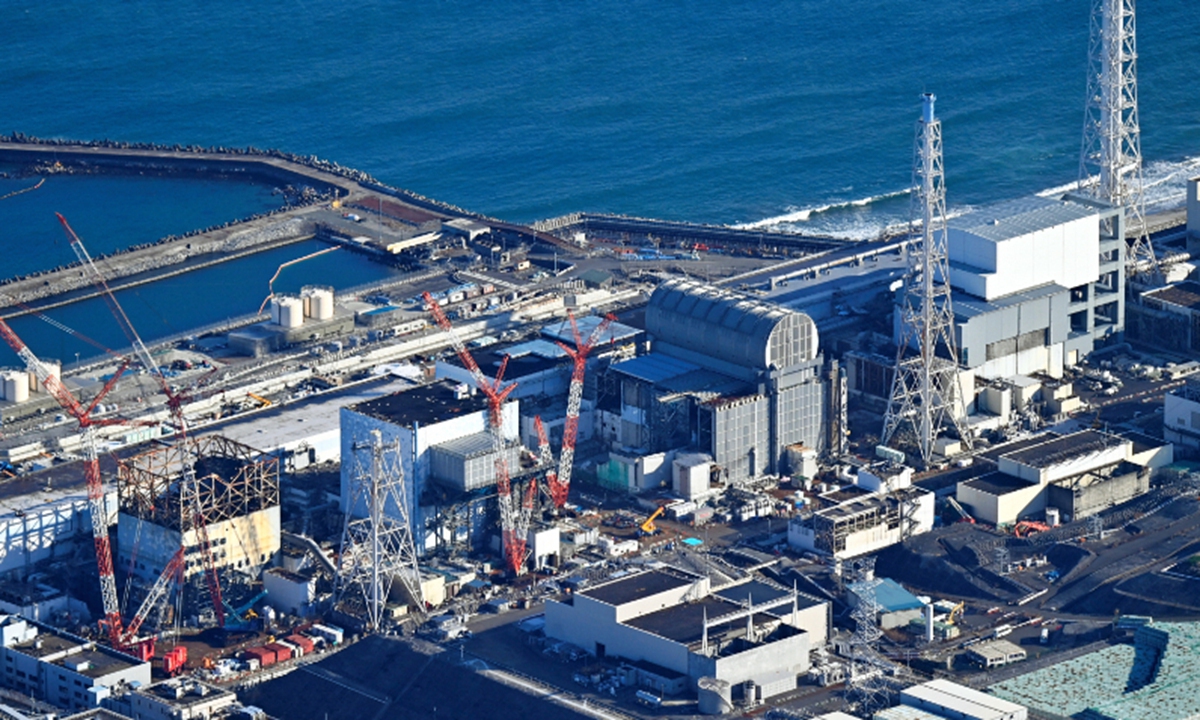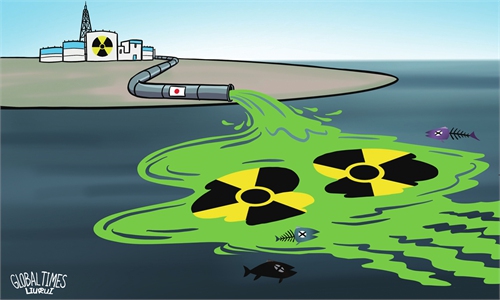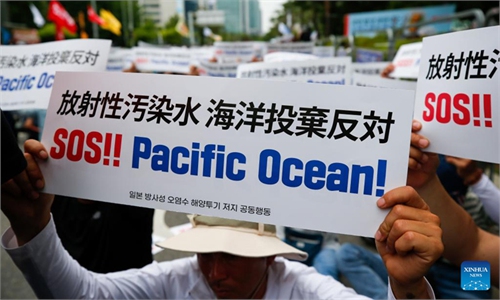Japan’s Fukushima radioactive wastewater dumping trial sparks anger with insiders calling to suspend industry trade, cooperation

Aerial photo shows the damaged reactors at Fukushima Daiichi nuclear power plant on January 19, 2023, in Fukushima, Japan. Photo: VCG
Industry insiders are calling for the suspension of cooperation and trade with Japan in the fishery sector in response to the Japanese government's blatant and irresponsible move to start the trail dumping of Fukushima radioactive wastewater into the sea.
Despite widespread condemnation from the international community, the Japanese operator of the crippled Fukushima Daiichi nuclear power plant has callously proceeded with its plan on Monday to commence trials for disposing of nuclear-contaminated wastewater into the Pacific Ocean.
Industry representatives expressed their deep upset and anger in the face of the Japanese move, with some calling for counter actions to be taken in response.
The head of a Chinese fisheries industry association told the Global Times that in response to the Japanese move, "we should consider a suspension of the current bilateral cooperation between Chinese and Japanese fisheries industries and a halt to corresponding trade related to fisheries."
Chinese and Japanese fisheries industries share a wide range of cooperation arrangements from maritime farming to research and trade.
Japan exports of meat, fish and seafood amounted to $623.13 million during 2022, according to the United Nations COMTRADE database on international trade. China remained one of the largest seafood importers for Japan.
Some localities are also ramping up efforts to deal with the potential risks caused by the dumping.
Macao Special Administrative Region (SAR) Government is closely monitoring Japan's plan to release contaminated water from Fukushima into the ocean, O Lam, Acting President of the Administration Committee on Municipal Affairs of the Municipal Affairs Bureau, said in a media interview on Tuesday, adding that the SAR will promptly widen the scope of import suspensions to encompass the nine highest-risk prefectures in Japan, including seafood, vegetables and fruit from Tokyo and Chiba, should Japan proceed with the discharge.
The Macao Municipal Affairs Bureau is maintaining close contact with the General Administration of Customs and neighboring regions to follow up on the latest developments, O Lam said.
It has not ruled out that fresh and live food imported from other Japanese counties will be required to attach a radiation test certificate and pass relevant inspection and quarantine measures before being allowed to import products, the SAR official said.
Cui He, president of the China Aquatic Products Processing and Marketing Alliance, told the Global Times that the discharge of nuclear wastewater by Japan undoubtedly raises concerns among domestic and international consumers about potential radiation pollution in seafood.
Their move has drawn deep concern and protests among industry players, Cui added.
The actual impact on China's aquaculture industry remains unknown, as there is currently no scientific data available to demonstrate the exact damage to China's fishery industry. However, industry insiders emphasize the importance of closely observing the situation, considering the potential damage that radioactive wastewater could cause to marine life and the environment.
The latest test results show that the radioactive element cesium contained in the fish caught in the harbor of the Fukushima nuclear power plant exceeded the standard, reaching 180 times the Japanese legal standard, a figure which has struck widespread concern.
Studies have shown that the relevant radioactive materials can spread to most of the Pacific Ocean within 57 days from the date of discharge into the sea, and spread to the global ocean in 10 years, according to media reports.
"Previously, there were restrictions on importing products from around Fukushima in Japan, but I am not aware of the latest developments," Cui said.
China has maintained flexibility in balancing its seafood trade portion by diversifying its seafood imports. Several countries, including Ecuador, Russia, Vietnam, and the US, have emerged as significant seafood suppliers to the Chinese market.
While the customs authorities have not yet issued any notification, the quantity of Japanese seafood imported into China is not significant, and many Sushi products at Japanese restaurants come from other regions far away from Fukushima, Cui said.
"Without Japan, our fishing industry can still thrive," the industry insider said.


